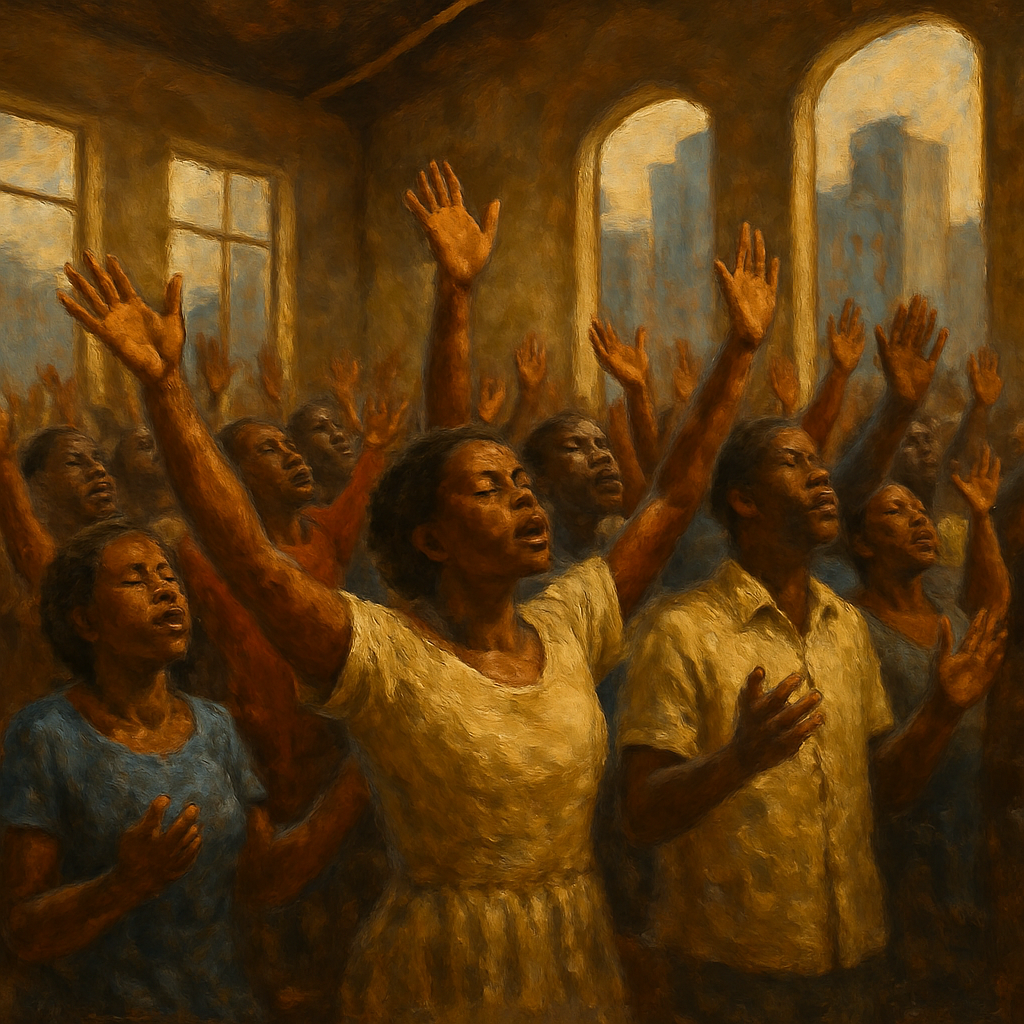The Church in Africa: Preparing for the Lord's Return

Introduction
Beloved brothers and sisters in Christ across the African continent, I write to you with both a heart of deep admiration and earnest concern. As the Kingdom Birth Model demonstrates with mathematical precision, we stand in the final stage of the Fourth Seal (2020-2026), with the Rapture projected for September 2026. In these critical moments before the Lord's imminent return, both correction and encouragement are needed to prepare the Bride of Christ.
The African Church stands as a beacon of faith in many respects, yet like all of Christ's Body worldwide, it faces specific challenges that must be addressed. This treatise speaks to both, that you might be "presented perfect in Christ Jesus" (Colossians 1:28) at His appearing.
I. Identifying False Shepherds Who Fleece God's Flock
The prevalence of prosperity preachers and spiritual entrepreneurs across Africa represents one of the most serious threats to authentic Christianity on the continent. Scripture provides clear criteria to identify false shepherds:
Biblical Identifiers of False Shepherds
- Financial Exploitation: "In their greed these teachers will exploit you with fabricated stories" (2 Peter 2:3). When pastors demand "seed offerings" with promises of multiplication, require payment for prayers, or live extravagantly while their congregants remain impoverished, they reveal themselves as exploiters.
- Self-Glorification: "They are loud in promoting themselves" (Jude 1:16). False pastors seek personal fame, requiring honorific titles, displaying their photos prominently, and focusing attention on themselves rather than Christ.
- Miraculous Claims Without Christlike Character: "Many will say to me on that day, 'Lord, Lord, did we not prophesy in your name and in your name drive out demons and in your name perform many miracles?' Then I will tell them plainly, 'I never knew you'" (Matthew 7:22-23). Dramatic spiritual manifestations without the fruit of the Spirit (Galatians 5:22-23) indicate falsehood.
- Absence of Sound Doctrine: "For the time will come when people will not put up with sound doctrine... they will gather around them a great number of teachers to say what their itching ears want to hear" (2 Timothy 4:3). When prosperity and success replace repentance and discipleship as central themes, doctrine has been compromised.
Practical Steps to Protect Yourself
- Test all teaching against Scripture, following the example of the Bereans (Acts 17:11)
- Watch for pastors who resist financial accountability or transparency
- Beware of those who claim exclusive spiritual authority or discourage questions
- Recognize that genuine shepherds serve sacrificially rather than demanding service (1 Peter 5:2-3)
- Understand that true blessing may include suffering, not merely prosperity (Philippians 1:29)
II. The True Nature of Apostolic Ministry
The Biblical Office of Apostle
The New Testament establishes clear qualifications for the foundational apostolic office:
- Direct Commission by Christ: The original apostles were personally called by Jesus during His earthly ministry (Mark 3:13-19), or in Paul's exceptional case, through a dramatic post-resurrection appearance confirmed by others (Acts 9:3-19).
- Eyewitness of the Resurrected Christ: Peter established this criterion when selecting Matthias: "Therefore it is necessary to choose one of the men who have been with us the whole time the Lord Jesus was living among us... one of these must become a witness with us of his resurrection" (Acts 1:21-22). Paul also qualified through his Damascus road experience: "Am I not an apostle? Have I not seen Jesus our Lord?" (1 Corinthians 9:1).
- Public Recognition: Both the Twelve and Paul were publicly acknowledged. Even Paul, though converted through a private revelation, had his calling confirmed publicly: "The Holy Spirit said, 'Set apart for me Barnabas and Saul for the work to which I have called them'" (Acts 13:2).
- Authenticating Signs: "The things that mark an apostle—signs, wonders and miracles—were done among you with great perseverance" (2 Corinthians 12:12).
Apostolic Function vs. Apostolic Office
Scripture distinguishes between the foundational apostolic office and ongoing apostolic function:
- The Foundation vs. the Building: "Built on the foundation of the apostles and prophets, with Christ Jesus himself as the chief cornerstone" (Ephesians 2:20). A foundation is laid once; the building continues to rise.
- Apostolic Function Today: While the foundational office closed with the original apostles, the apostolic function of pioneering, planting, and overseeing multiple churches continues through those gifted for cross-church leadership.
- Modern "Apostles": Those claiming the title "Apostle" today should be evaluated carefully. They may exercise valid apostolic gifting without holding the foundational office. The test is whether they serve Christ's kingdom or build personal empires.
III. Confronting Witchcraft in the Church
The syncretism between traditional spiritual practices and Christianity threatens the purity of faith across Africa. Scripture explicitly condemns all forms of divination, sorcery, and witchcraft:
Biblical Prohibitions
- "Do not practice divination or seek omens" (Leviticus 19:26)
- "Anyone who practices divination or tells fortunes or interprets omens, or a sorcerer or a charmer or a medium or a necromancer or one who inquires of the dead, for whoever does these things is an abomination to the LORD" (Deuteronomy 18:10-12)
- "The acts of the flesh are obvious... witchcraft... those who live like this will not inherit the kingdom of God" (Galatians 5:19-21)
Common Manifestations in Churches
- "Prophets" who function as diviners, revealing secrets for payment
- Rituals involving special objects (handkerchiefs, water, oil) treated as having inherent power
- Ancestral ceremonies incorporated into Christian worship
- Fear-based spiritual warfare focusing on curses rather than Christ's authority
- Prosperity rituals that resemble transactional magic
The Path to Purity
- Recognize Christ's complete supremacy over all spiritual powers (Colossians 2:15)
- Understand that genuine spiritual warfare is fought through truth, righteousness, faith, salvation, and God's Word—not rituals or formulas (Ephesians 6:10-18)
- Repent of and renounce all practices that seek spiritual power outside Christ
- Embrace the sufficiency of Christ: "His divine power has given us everything we need for a godly life" (2 Peter 1:3)
IV. Addressing Sexual Immorality
The acceptance of sexual immorality among both leaders and congregants undermines the church's witness. Scripture is clear: "Among you there must not be even a hint of sexual immorality" (Ephesians 5:3).
Areas Requiring Repentance
- Leaders Living in Sexual Sin: "The overseer is to be... faithful to his wife" (1 Timothy 3:2). Pastors with multiple partners or secret relationships disqualify themselves from ministry.
- Cohabitation Without Marriage: Many believers live with partners without formal marriage, contradicting biblical teaching that sexual intimacy belongs exclusively within marriage (Hebrews 13:4).
- Transactional Relationships: The practice of older "sponsors" supporting younger partners financially in exchange for sexual relationships violates the sanctity of both body and relationship.
- Cultural Practices Contrary to Scripture: Traditional practices regarding polygamy, bride price exploitation, or widow inheritance that contradict Christian teaching on marriage must be reformed.
The Call to Sexual Integrity
- Support church discipline for leaders involved in sexual immorality (1 Corinthians 5:11-13)
- Establish clear paths for repentance, restoration, and accountability
- Create church cultures that address sexual ethics openly and biblically
- Provide practical support for struggling members, particularly the vulnerable
Instead of letting secret sexual sin grow in the church; church leaders must acknowledge the challenges of congregants--and enforce Torah provisions for covenant sexual/marital relationships before God; either via polygny or concubinage--with bride prices and righteous covenant living taught. In the absence of this; the church is actively by way of silence--encouraging unmarried but mature [usually sexually active] women, single mothers, and men to engage in sexual immorality. Instead it should demonstrate what sexual purity looks like; commending monogamy but allowing the weak to engage in polygamy--and where sexual immorality still exists despite these provisions; excommunicating congregants. For guidance on this; church leaders should read the following; Deuteronomy 21, Genesis 16, and Exodus 22:16–17. Here is an example:
If a man has two wives, the one loved and the other unloved, and both the loved and the unloved have borne him children, and if the firstborn son belongs to the unloved, then on the day when he assigns his possessions as an inheritance to his sons, he may not treat the son of the loved as the firstborn in preference to the son of the unloved, who is the firstborn, but he shall acknowledge the firstborn, the son of the unloved, by giving him a double portion of all that he has, for he is the firstfruits of his strength. The right of the firstborn is his.
Deuteronomy 21:15-17
V. Establishing True Accountability
Accountability structures often fail when built around hierarchical authority rather than mutual submission. True biblical accountability requires:
For Leaders
- Transparent Financial Systems: "We are taking pains to do what is right, not only in the eyes of the Lord but also in the eyes of man" (2 Corinthians 8:21). Church finances should be managed by qualified teams, regularly audited, and openly reported.
- Plural Leadership: "Paul and Barnabas appointed elders for them in each church" (Acts 14:23). The New Testament consistently presents plurality of elders, not lone leaders.
- Honest Reporting: Claims about membership, miracles, and ministry should be truthful, avoiding exaggeration for status or support.
For Congregants
- Authentic Community: "Confess your sins to each other and pray for each other" (James 5:16). Christians need relationships where they can be known and held accountable.
- Scripture as Authority: All teaching must be tested against God's Word, not the leader's charisma or claims.
- Mutual Responsibility: "Brothers and sisters, if someone is caught in a sin, you who live by the Spirit should restore that person gently" (Galatians 6:1). Accountability is everyone's responsibility.
VI. Confronting the Idolatry of Money and Status
The pursuit of prosperity and social position has become a dominant narrative in many churches, displacing the gospel of self-denial and Christ-centeredness.
Signs of This Idolatry
- Preaching focused primarily on financial breakthrough rather than Christlikeness
- Church structures that privilege the wealthy and marginalize the poor
- Ministerial success measured by buildings, cars, and attire rather than discipleship
- Testimonies centered on material acquisition rather than spiritual transformation
Returning to Biblical Values
- "For the love of money is a root of all kinds of evil" (1 Timothy 6:10). Wealth is not inherently evil, but its pursuit easily becomes idolatrous.
- "What good will it be for someone to gain the whole world, yet forfeit their soul?" (Matthew 16:26). Eternal perspective must prevail over temporal gain.
- "Each of you should use whatever gift you have received to serve others" (1 Peter 4:10). Resources are for service, not status.
- "For you know the grace of our Lord Jesus Christ, that though he was rich, yet for your sake he became poor" (2 Corinthians 8:9). Christ's example challenges prosperity theology at its core.
VII. Commendation: The Strengths of the African Church
Despite these challenges, the African Church demonstrates remarkable faithfulness that believers worldwide should emulate:
1. Unwavering Biblical Morality
While many Western churches compromise with cultural pressure, African Christians generally maintain biblical standards regarding sexuality and marriage. Your clarity that Scripture defines marriage as between one man and one woman is a prophetic witness to a confused world.
2. Evangelistic Fervor
The explosive growth of Christianity across Africa testifies to your passion for sharing the gospel. Many congregations commit to aggressive evangelism, church planting, and mission work despite limited resources.
3. Faith That Crosses Borders
African Christians carry their vibrant faith when migrating to Europe, North America, and beyond, often revitalizing struggling churches. Your missionaries and immigrant believers bring spiritual renewal to secularized regions.
4. Bold Public Witness
Unlike many Western Christians intimidated by secular culture, African believers openly declare their faith in workplaces, universities, and public forums. This courage is exemplary in an increasingly hostile world.
5. Perseverance Through Persecution
In regions facing Islamic extremism or government oppression, African Christians demonstrate extraordinary faithfulness even unto death. Your willingness to suffer for Christ inspires the global church.
6. Sacrificial Giving
Despite economic challenges, many African Christians practice remarkable generosity, giving substantially from limited resources. This reflects the Macedonian churches who gave "out of their extreme poverty" (2 Corinthians 8:2).
7. Spiritual Vitality
Your enthusiastic worship, fervent prayer, and openness to the Holy Spirit's work stand in stark contrast to the spiritual lethargy afflicting many Western churches. This zeal must be preserved while keeping biblical balance.
VIII. Preparing for What Lies Ahead
The mathematical precision of prophetic fulfillment indicates we are in the late stages of Seal 4 (2020-2026), with the Rapture projected for September 2026 followed by the 70th Week. This reality demands urgent preparation:
1. Communal Resilience
As Seal 4 matures, intensified crises will require churches to function as support networks. Develop practical systems for:
- Food security and resource sharing
- Medical support and alternative care
- Communication when systems fail
- Protection of the vulnerable
2. Spiritual Preparation
The coming days demand spiritual maturity:
- Deep grounding in Scripture to discern truth from deception
- Practiced faith that doesn't depend on prosperity or ease
- Prayer lives sustained by relationship rather than emotion
- Communities marked by genuine love that can endure pressure
3. Leadership Development
Prepare multiple leaders who:
- Understand biblical prophecy and can interpret events through Scripture
- Can shepherd without dependence on buildings or technology
- Prioritize faithfulness over numerical or material growth
- Model Christlikeness rather than worldly success
4. Purification of the Church
Now is the time to address the issues identified in this treatise:
- Confront false teaching and exploitative leadership
- Cleanse syncretistic practices and compromised ethics
- Establish biblical accountability at every level
- Renew focus on Christ's kingdom rather than personal empires
Conclusion: Called to Such a Time as This
Beloved African Church, you stand at a pivotal moment in redemptive history. The Lord has preserved and grown your faith for this critical season. Your strengths—biblical fidelity, evangelistic zeal, bold witness, perseverance through suffering, sacrificial giving, and spiritual vitality—are precisely what the global church needs as we approach the culmination of this age.
Yet like Esther, you are called to purification before entering the king's presence (Esther 2:12). The issues addressed in this treatise require honest examination and courageous correction. As the Bridegroom approaches, prepare yourselves as a Bride "without stain or wrinkle or any other blemish, but holy and blameless" (Ephesians 5:27).
The Lord declares over you the words He spoke to the church in Philadelphia: "I know your deeds. See, I have placed before you an open door that no one can shut. I know that you have little strength, yet you have kept my word and have not denied my name" (Revelation 3:8).
Hold fast what you have. Correct what needs correction. Prepare for the imminent return of your King.
Maranatha! Come, Lord Jesus!


Comments ()